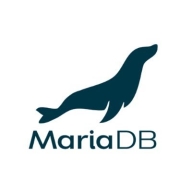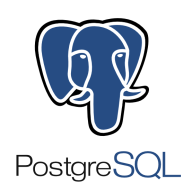


Find out what your peers are saying about Oracle, PostgreSQL, Firebird and others in Open Source Databases.



MariaDB is an open source relational database created by the original founders of MySQL. It is considered one of the most popular and trusted database servers throughout the world. MariaDB is a valued component found in most cloud offerings and is the default in many Linux tools. It is also widely used by Wikipedia, WordPress, and Google, among other well-known sites. Maria DB easily melds data into concise information from a vast array of applications, such as banking, online shopping, websites, and more.
MariaDB was originally created to improve MySQL performance. It is the most widely chosen database server due to the solution being super fast, robust, user-friendly, and easily scalable. MariaDB also offers a substantial ecosystem of plugins, storage engines, and numerous other valuable tools that make it very attractive for a significant offering of use cases.
The solution’s newest functionalities include compatibility with Oracle Database and Temporal Data Tables, and advanced clustering with Galera Cluster 4, which make it easier for users to research data history from any point in the past. Additionally, the most recent versions include JSON and GIS features. MariaDB is committed to staying an open source solution.
MariaDB Features
Reviews from Real Users
Faustine C., Engineering Supervisor- Corporate Data Solutions and Services at TZ Telecoms Corporation, shares, “The software provides a lot of information on what is happening inside the database. For most performance parameters it is easy to know if something is not right in the configuration or optimization which helps engineers take remedial fine-tuning measures. For example, if the database is underperforming it is easy to know which performance parameter can be adjusted to handle the workload. It is difficult to troubleshoot database issues if many performance parameters can not be monitored or debugged which is the case with some database management systems. It provides great monitoring of data storage, processing, and performance stability which is really important for real-time data storage and processing. It's a user-friendly product.”
A PeerSpot user who is a Senior Engineer at a tech services company relates, “ The solution's high availability is its most valuable aspect. We have found the product to be stable and the initial setup is pretty simple. I'd rate the solution at a ten out of ten. I'm very happy with it overall. I would recommend the solution to others. It's easy to find details about the product online and to learn about it.”
MySQL is a cost-efficient and scalable relational database management system widely used in web, mobile applications, and academic projects.
MySQL is utilized for backend operations, data analysis, reporting, financial transactions, and ERP databases. It supports deployment on local servers, Cloud, and Kubernetes. Its free, open-source nature along with strong community support make it popular among companies. MySQL's compatibility with multiple platforms and programming languages enhances its appeal. While it remains stable and easy to use, areas such as replication, clustering, and backup require improvement to better serve enterprise applications. Enhanced security, error messages, and monitoring tools are also desired for a better user experience.
What are the most important features of MySQL?In multiple industries, MySQL supports internal applications, billing systems, academic teaching purposes, and ERP databases. Companies leverage MySQL for Cloud and local deployments, ensuring effective data manipulation and backend operations in diverse projects. Its role in financial transactions and reporting further emphasizes its versatility.
PostgreSQL is a versatile and reliable database management system commonly used for web development, data analysis, and building scalable databases.
It offers advanced features like indexing, replication, and transaction management. Users appreciate its flexibility, performance, and ability to handle large amounts of data efficiently. Its robustness, scalability, and support for complex queries make it highly valuable.
Additionally, PostgreSQL's extensibility, flexibility, community support, and frequent updates contribute to its ongoing improvement and stability.